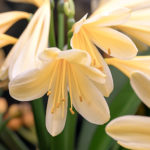Talking to your plants in Quarantine

If you’re anything like me, this Michigan shelter-in-place quarantine has been quite the eye-opening experience. While I happen to be very introverted by nature, the lack of human connection during this time has me going a bit stir crazy. At random points in the day I find myself talking to the various plants sprinkled around my apartment. The conversations are a little one-sided, but they got me thinking: does talking to your plants benefit them or you?

Scientific evidence on this particular subject is somewhat sparse. Although this is not a new theory (Many believe the first mention of this particular ideology is “Nanna oder über das Seelenleben der Pflanzen” by Gustav Fechner) few actual studies have been conducted. In Fechner’s 1848 book, he puts forward the idea that plants have a soul of sorts. Although his premise was founded mostly on his own feelings and observations, it has become the basis for the few studies that exist today. A 2008 study from the National Institute of Agricultural Biotechnology, Rural Development Administration “identified a set of sound-responsive genes in plants” (1). The study suggests that both genes are responsive to sounds above 125Hz. The typical adult male has a vocal frequency between 85Hz and 180Hz, while the typical adult female has a vocal frequency between 165Hz and 255Hz. Sorry guys, women are just better when it comes to plants! A separate study published in the Journal of Experimental Botany found a link between sound vibrations and several outcomes including: “increase the yields of several crops and strengthen plant immunity against pathogens. These vibrations can also prime the plants so as to make them more tolerant to impending drought.” (2).

While there may not a ton of hard scientific data related to the effect of speech on plants, there is quite a bit of anecdotal evidence! On a 2004 Episode of Mythbusters, seven separate greenhouses were set up with varying levels of noise. Stereos playing loops of speech were set up in the greenhouses; Two of negative speech, two of positive speech, a fifth with classical music and a sixth with intense death metal music. A seventh greenhouse, used as a control sample, had no stereo. The control group grew the least out of the seven after 2 months.

Possibly one of the saddest commercials I’ve seen in recent years (with the exception of the ASPCA ads. The song gets me every time.) is a viral video (3) produced by IKEA last year. It was intended to show the effect of unkind words on children. In the experiment, two plants were isolated in identical, controlled environments and received either positive or negative comments through a speaker. After 30 days, the plant that received negative comments was visibly less healthy. Now obviously this wasn’t a strictly scientific experiment, it was an awareness campaign. It’s entirely possible that there were, lets just say ...outside factors... contributing to that poor plants’ demise. I sincerely hope not, because intentionally killing a plant seems a bit over the top for an ad campaign but this is the world we live in.

Here’s my takeaway: until someone initiates a large scale scientific experiment, we can’t conclude that talking to your plants absolutely will or will not help them grow. Really though, what could it hurt? The worst thing that could happen is people could conclude you’ve gone a bit mad. The Mad Hatter said it best “You’re entirely bonkers! but I’ll tell you a secret: all the best people are.”

1.) Jeong, M., Shim, C., Lee, , J. et al. Plant gene responses to frequency-specific sound signals. Mol Breeding 21, 217–226 (2008). https://doi.org/10.1007/s11032-007-9122-x
2.) Ratnesh Chandra Mishra, Ritesh Ghosh, Hanhong Bae, Plant acoustics: in the search of a sound mechanism for sound signaling in plants, Journal of Experimental Botany, Volume 67, Issue 15, August 2016, PaMad ges 4483–4494,
3.) Bully A Plant (IKEA) on YouTube
